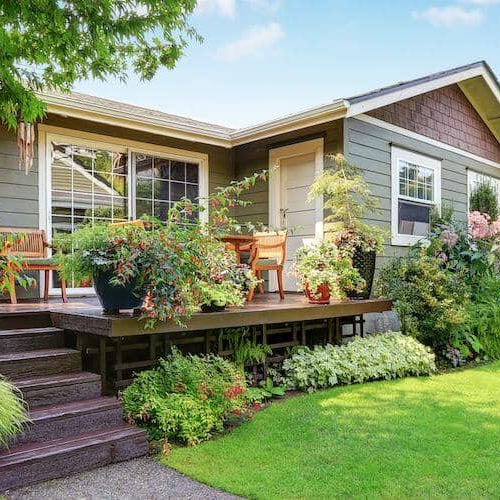What does it mean to lease a house?
Contributed by Sarah Henseler
Dec 8, 2025
•9-minute read
Whether you’re a dedicated renter or a hopeful home buyer, understanding exactly what it means to lease a house can help you save time, money, and stress. When you lease a house you enter into a contract with a landlord to live in their house for a certain amount of time, typically 6 months or a year.
Leasing gives you a structured, fairly long-term agreement that, in some cases, can even include an option to buy the home in the future. Leases can be beneficial to renters looking for stability and for prospective homebuyers looking to assess a house or neighborhood before committing.
Here, we’ll answer in more detail common questions like “What does leasing a house mean?” and “What’s the difference between renting and leasing?” We’ll also cover specifics of the different types of leases – there are many – and how leasing compares to buying a home.
What is a lease agreement?
In plain terms, a lease agreement is a legally binding contract between two parties: the tenant (lessee) and the landlord (lessor). The document outlines the terms and conditions each has regarding the tenant living in the property for a specific period of time, commonly a year. It also details how much rent will be paid, when the payments are due, who is responsible for maintenance, repairs, and utilities, and other essential details.
Leases can also have their own unique qualities. One example might be a rent-to-own lease in which the tenant retains the option to buy the property at some point in the future. There are other kinds of leases as well.
Types of residential leases
The following are the common types of leases and how they differ. Each one offers pros and cons to tenants and landlords.
- Absolute net lease: The tenant is responsible for all costs associated with the property. The tenant pays the rent, property taxes, insurance, and maintenance expenses. In essence, the tenant takes on the financial responsibilities typically borne by the property owner.
- Triple net lease: The tenant pays for the rent, property taxes, insurance, and repairs, but the rest of the responsibilities are assumed by the landlord. A budget for these costs is set at the beginning of the year by the landlord to be collected monthly from the tenant. Tenants are responsible for any discrepancies at the end of the year if these expenses are over budget.
- Modified gross lease: A hybrid lease structure that requires the landlord and tenant to share expenses. The specific terms of this arrangement depend on how the two parties negotiate the responsibilities. For example, the tenant may cover rent, utilities, and repairs while the landlord pays for insurance and taxes.
- Full-service lease: The landlord assumes responsibility for most or all of the property's operating expenses, including property taxes, insurance, maintenance, and utilities. The tenant pays a fixed, all-inclusive rent amount, making it a more straightforward and predictable arrangement for the tenant.
What information is included in a lease agreement?
Before you lease a house, you should read the lease carefully. A few of the more important details to check are who is responsible for repairs and maintenance, when the rent is due each month and the penalty for paying late, whether your security deposit is refundable, the policy on pets and subleasing, and dispute resolution methods.
The above is not an exhaustive list. The important point is that the lease is your go-to document if a disagreement occurs in the future, so make sure it aligns with your expectations.
Although lease agreements vary by landlord and property type, all contracts should include the following essentials:
- The address of the property
- The responsibilities of the landlord and tenant
- The rent amount
- The security deposit
- Rent payment due date
- Breach of contract consequences
- The lease agreement duration
- Pet policies
- Occupancy limits
- Illegal activity clause
- Subletting policy
- Maintenance responsibilities
What is the difference between a rent and a lease agreement?
Rental and leasing agreements are very similar – so similar that people often use the terms interchangeably. But there are meaningful differences between the two.
Generally speaking, a lease agreement is usually for a longer term, such as 6 months, a year, or more. A rental agreement is usually shorter, often month-to-month. This means that a landlord can change the terms of the rental agreement more often.
What is a rent-to-own agreement?
A rent-to-own agreement combines features of both renting and buying into one contract. Here, tenants pay rent as usual but they retain the option to buy the home sometime in the future for a price agreed to when the agreement is formed.
For this, the tenant normally has to pay an up-front option fee, which is nonrefundable. This secures their right to buy the home and is typically credited toward the purchase price of the home. If you need time to build credit to qualify for a mortgage or save up for a down payment, this could work for you.
What does leasing a house mean?
Leasing a house means the tenant enters into a formal contract with the property owner (or landlord), whose terms allow the tenant to rent the property in exchange for regular payments over an agreed-upon time frame.
Typically, leasing terms for a house are 1 – 3 years. The tenant is expected to pay an up-front option fee. This nonrefundable payment secures the tenant's right to purchase the property at a specified time for a predetermined price.
The key component, and a potential advantage, is that the market fluctuations don't affect the price, depending on the economy. The tenant pays monthly rent to the landlord, but if the two parties agree to a sales arrangement, a portion of the rent can go toward the purchase price. If the tenant doesn't want to buy the house when the contract expires, they'll forfeit the option fee.
This type of agreement can be beneficial for both parties: The tenant has the opportunity to live in a house without having to secure a mortgage immediately, and the landlord may secure a tenant with a vested interest in maintaining the property.
Buying vs. leasing a home: What is the difference?
Buying a home is not necessarily better or worse than leasing one. Both options come with unique features that match different lifestyles and financial situations. Here are some key differences.
|
Feature |
Buying a home |
Leasing a home |
|
Up-front costs |
Down payment (often between 3% – 20%), closing costs and other fees |
Security deposit (often 1 – 2 months’ rent), first month’s rent, and application fees |
|
Monthly payments |
Mortgage payments, including property taxes, homeowners insurance, and HOA fees |
Rent and utilities, depending on the lease agreement |
|
Equity building |
Builds with monthly payments and the value of the home |
No equity; payments go to the landlord |
|
Maintenance and repairs |
Buyer is responsible for all repairs and maintenance costs. |
Landlord is typically responsible for major repairs and maintenance. |
|
Flexibility |
Harder to relocate quickly; selling can take months |
Easier to move due to short-term commitment |
|
Tax benefits |
Interest and property taxes may be deductible. |
Payments on the home aren’t tax deductible. |
|
Long-term costs |
Lower over the decades; value may appreciate |
Can increase annually |
|
Stability |
Lower risk of eviction due to foreclosure legal procedures |
Lease terms can change, increasing the risk of nonrenewal or rent hikes. |
|
Customization |
Renovations or remodels can increase the value of the home. |
Any changes to the property may need approval from the landlord. |
|
Ideal for |
People seeking long-term stability, equity, and control over their home |
People seeking flexibility, lower up-front costs, and less maintenance responsibility |
What are the pros and cons of leasing a house?
Leasing a home includes many advantages. It also comes with some drawbacks. Let’s take a look at some of the more important pros and cons.
Pros
- Lower up-front costs: As opposed to buying a home, which requires a large down payment and other up-front costs, leasing a home typically only requires a deposit and first month’s rent.
- No closing costs: Buying a home can involve closing costs of up to 6% of the loan amount. Tenants don’t pay things like mortgage origination, title insurance, or other fees.
- Fewer repair and maintenance responsibilities: With most leases, the landlord will be responsible for maintenance and repairs. This means fewer ongoing or surprise costs.
- No property taxes: When you own a home, you pay property taxes, which, in some states, can be substantial. Tenants don’t pay property taxes.
- Lower insurance responsibility: Renters typically only need renters insurance, which is much less expensive than homeowners insurance.
Cons
- Rent can increase annually: A lease agreement is only good for the amount of time specified, typically a year. Once that ends, it means the landlord can increase the rent or change the terms.
- Dependence on the landlord: If your landlord or property manager isn’t responsive to repairs or maintenance that’s needed, it can be frustrating and could lower your standard of living.
- No control over contractors or repair people: Even if the landlord is good about maintenance or repairs, they might not choose the quality of craftsmen or products you would if the home was yours.
- Inflexible lease length: If you need to break a lease and move out early, it can be costly. You could be obligated to pay penalties or forfeit your deposit.
- Option fee can be lost: If you enter into a rent-to-own lease and fail to buy the property at the end of the term, it’s likely that you forfeit your up-front option fee, which could be substantial.
- Lack of equity or tax breaks: When you lease or rent, you’re not building equity in a home. You also miss out on potential tax deductions that homeowners enjoy, such as writing off the interest on a mortgage.
When can you break a lease?
We all know that life is a pretty good curveball pitcher, so there might be situations when you need to consider breaking your lease. And while it’s understandable, it’s also important to carefully consider the ramifications.
Renters have valid reasons for wanting to end a lease agreement early; for example, if you need to relocate for a job, leave for health and safety reasons, or purchase a home. However, breaking a lease has financial implications unless you're in a protected group.
Breaking your lease will incur financial penalties, such as losing your security deposit or paying the remaining rent owed immediately. For this reason, many renters find an alternative, such as subletting their home, finding someone to take over the lease, or switching to a monthly arrangement.
Different states have varying protections and tenant-landlord laws, so you should thoroughly research your state’s before making any decisions.
Protected groups
There are certain groups who enjoy special protections, allowing them to end leases without penalties. These include:
- Military personnel: Under the Servicemembers Civil Relief Act, military members can break a lease without penalty if they’re deployed or relocated. The reason for this is obvious – they don’t control the reason they must break their lease.
- Domestic violence survivors: Federal and state housing laws protect survivors of domestic violence. They are allowed to break their lease in order to ensure their safety.
- People with disabilities: The Americans with Disabilities Act and Fair Housing laws prohibit discrimination and offer reasonable living arrangements for disabled tenants. If these conditions are violated, breaking a lease is acceptable.
FAQ about renting and leasing
Hopefully, we’ve answered all your major questions. Here are a few additional common ones about what it means to lease a house.
Which is better: Renting or leasing a house?
Renting usually involves less commitment and lower up-front costs, while leasing includes more structure and sometimes a path to ownership. For tenants aiming to buy but needing time to improve finances or credit, a lease can be a smart bridge between renting and homeownership.
How can a lease affect my credit score?
A lease can help build credit if the landlord reports on-time rent payments to credit bureaus. However, breaking the lease or failing to pay can damage your credit — similar to missing a loan or credit card payment.
What is a verbal lease agreement?
A verbal lease occurs when the landlord and tenant agree to terms orally but don’t sign a written contract. While it may seem convenient, it’s risky because there’s no written proof of agreed-upon conditions. A signed lease provides legal protection for both parties.
The bottom line: Leasing a house can be a fair deal
Leasing a house is not always as simple as paying rent to stay in a place for a while. There are various kinds of leases, such as rent-to-own leases, and nuances to each type. It’s important to understand the terms and conditions of any lease you consider, especially if you plan to buy a home in the future.
Leasing can be less expensive than buying a home, but it can also come with some real drawbacks, such as not building any equity, the potential for rent increases, and losing out on tax deductions.
To decide whether leasing or buying a home is best for you, check out the Rocket Mortgage® Rent Vs. Buy Calculator. If you decide you’re ready to buy, get in touch with one of our Home Loan Experts to help determine the best mortgage option for you.

Terence Loose
Related resources

6-minute read
Rent vs. buy: What’s the difference?
Deciding between buying or renting your next home? Learn more about the differences and key factors to consider when making the rent-versus-buy decision.
Read more

8-minute read
How to determine if you should buy a house
A lot of factors go into determining whether or not you should buy a house. Here’s what you need to know when making the decision to buy now, or hold o...
Read more

8-minute read
How to find rent-to-own homes: A guide
Are you on the hunt for a rent-to-own home? Read our helpful guide on the different ways you can go about finding a rent-to-own home that fits your needs.
Read more